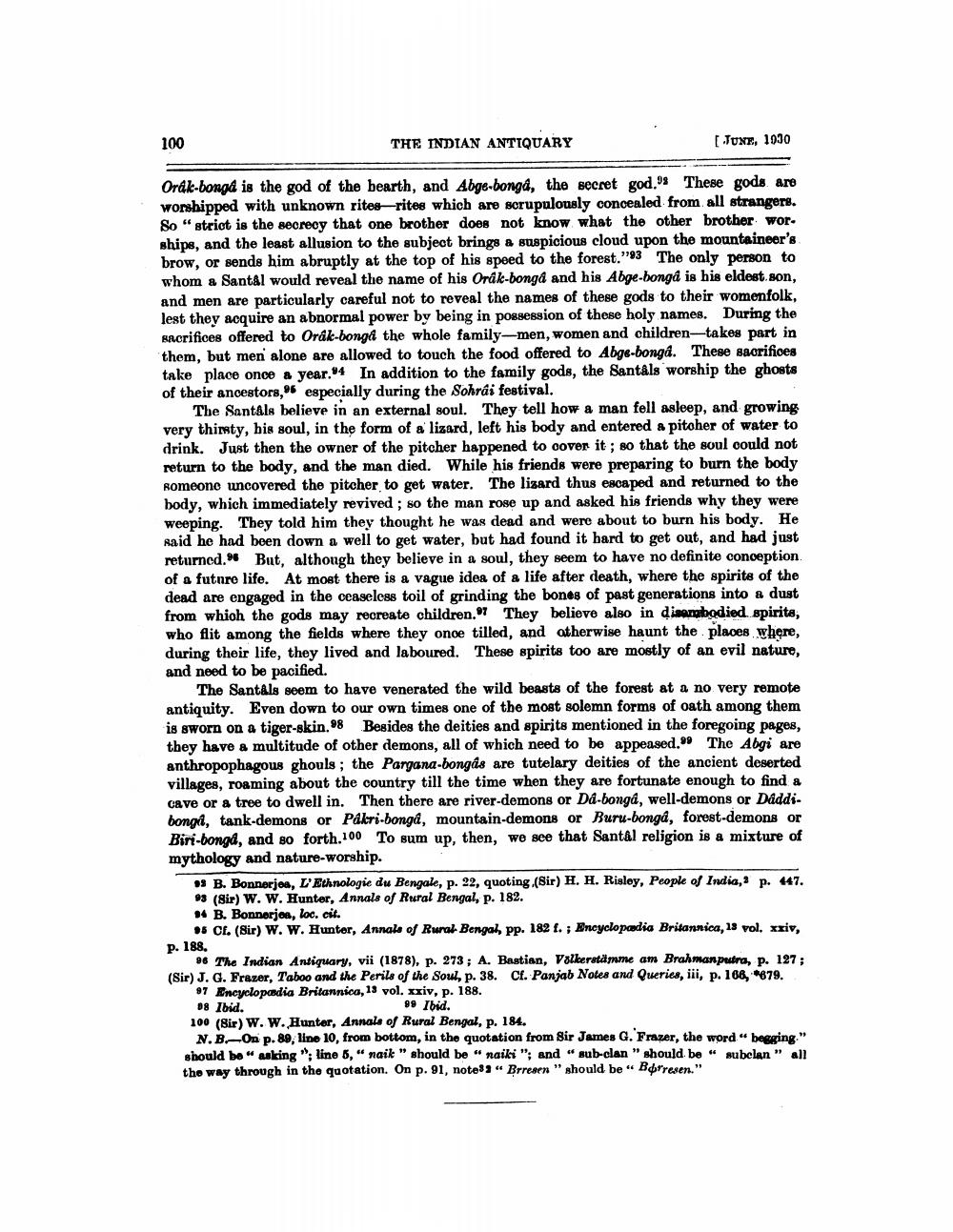________________
100
THE INDIAN ANTIQUARY
[JUNE, 1930
Ordk-bongd is the god of the bearth, and Abge-bongd, the secret god." These gods are worshipped with unknown rites-rites which are scrupulously concealed from all strangers. So "strict is the secrecy that one brother does not know what the other brother wor. ships, and the least allusion to the subject brings a suspicious cloud upon the mountaineer's brow, or sends him abruptly at the top of his speed to the forest."93 The only person to whom a Santål would reveal the name of his Orák-bongd and his Abge-bonga is his eldest son, and men are particularly careful not to reveal the names of these gods to their womenfolk, lest they acquire an abnormal power by being in possession of these holy names. During the Bacrifices offered to Orák-bongd the whole family-men, women and children-takes part in them, but men alone are allowed to touch the food offered to Abge-bongd. These sacrifices take place once a year. In addition to the family gods, the Santals worship the ghosts of their ancestors, especially during the Sohrai festival.
The Santåls believe in an external soul. They tell how a man fell asleep, and growing very thirty, his soul, in the form of a lizard, left his body and entered a pitcher of water to drink. Just then the owner of the pitcher happened to cover it; so that the soul could not return to the body, and the man died. While his friends were preparing to burn the body Romeone uncovered the pitcher to get water. The lizard thus escaped and returned to the body, which immediately revived; so the man rose up and asked his friends why they were weeping. They told him they thought he was dead and were about to burn his body. He Raid he had been down a well to get water, but had found it hard to get out, and had just returned. But, althongh they believe in a soul, they seem to have no definite conception of a futnre life. At moat there is a vague idea of a life after death, where the spirits of the dead are engaged in the ceaseless toil of grinding the bones of past generations into a dust from which the gods may recreate children. They believe also in disordbodied spirits, who flit among the fields where they onoe tilled, and otherwise haunt the places where, during their life, they lived and laboured. These spirits too are mostly of an evil nature, and need to be pacified.
The SantAls seem to have venerated the wild beasts of the forest at a no very remote antiquity. Even down to our own times one of the most solemn forms of oath among them is sworn on a tiger-skin.98 Besides the deities and spirits mentioned in the foregoing pages, they have a multitude of other demons, all of which need to be appeased." The Abgi are anthropophagous ghouls; the Pargana-bongás are tutelary deities of the ancient deserted villages, roaming about the country till the time when they are fortunate enough to find & cave or a tree to dwell in. Then there are river-demons or Da-bonga, well-demons or Daddibongit, tank-demons or Pakri-bongd, mountain-demons or Buru-bongd, forest-demons or Biri-bongd, and so forth.100 To sum up, then, we see that Santal religion is a mixture of mythology and nature-worship.
. B. Bonnerjoa, L'Ethnologie du Bengale, p. 22, quoting (Bir) H. H. Risloy, People of India,' p. 447. " (Sir) W. W. Hunter, Annals of Rural Bengal, p. 182. 14 B. Bonnerjea, loc. cit.
#5 CE. (Sir) W. W. Hunter, Annals of Rural Bengah, pp. 182 f. ; Encyclopædia Britannica, 18 vol. xxiv, p. 188.
96 The Indian Antiquary, vii (1878), p. 273 ; A. Bastian, Volkerstämme am Brahmanputra, p. 127; (Sir) J. G. Frazer, Taboo and the Perils of the Soul, p. 38. Cf. Panjab Notes and Queries, iii, p. 166, 1679.
97 Encyclopaedia Britannica, 13 vol. xxiv, p. 188. 18 Ibid.
99 Ibid. 100 (Bir) W. W. Hunter, Annals of Rural Bengal, p. 184.
N.B.-On p. 89, line 10, from bottom, in the quotation from Sir James G. Frazer, the word begging." should be asking", line 5," naik " should be " naiki "; and " sub-clan" should be subclan" all the way through in the quotation. On p. 91, notesy " Brresen " should be Børresen."




